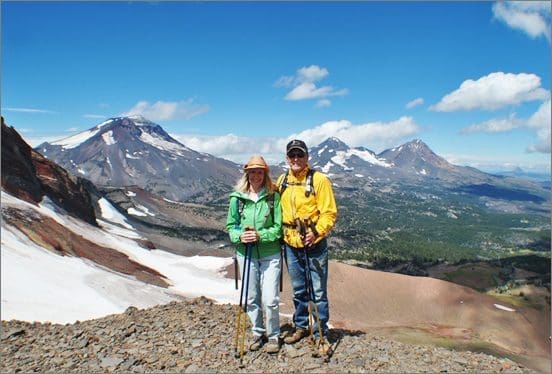There’s no getting around the fact that each of us is in one of three places: 1) in the middle of adversity; 2) coming out of a hard thing; or 3) about to head back into trouble.
Pretty encouraging stuff right there.
Since no one is exempt from adversity, the question becomes: What differentiates between those who flourish in difficulty — no matter how steep the trail — and those who struggle?
Hubby, brilliant computer geek, was unemployed for nearly two years. And then these words: “You’ve got cancer.” Financial setbacks. Terminal disease. Watching my beloved die.
We’ve known adversity.
And here are 8 things adversity did for us because we allowed it:
1. Taught us valuable life lessons. Lessons such as the importance of a support team; of making healthful lifestyle choices; and, that we can certainly choose how we react to troubles although we can’t choose what happens to us.
2. Made us more beautiful. By that I mean more gracious, more compassionate. Whenever I saw an able-bodied man holding a sign on a street corner, I used to say under my breath: This is America. Go get a job. Compassionate, right? But Hubby, who was a highly-skilled and hard-working man with excellent references couldn’t get any kind of work for nearly two years. Even after dumbing down his résumé.
3. Schooled us in gratitude. Somehow when you’re faced with a ticking clock, it makes you grateful for the now. Which begs the question, Why does it take the reality of losing something precious to make us truly grateful?
4. Led us into community. The adversity of cancer moved us deeper into community. These people weren’t just friends. They were comrades-in-arms. They were the ones who supported us through Hubby’s slipping away. My life is richer for knowing people I would not have otherwise known had it not been for cancer.
5. Reinforced family connections. We were (and I am still) loved by some pretty incredible kids and kids-in-law and grandkids. By siblings. Mom-in-law. Extended families on both sides. I have to say that cancer enhanced these already-strong relationships as we became more and more comfortable expressing our love for each other in light of potentially losing a father, a son, a brother, an uncle.
6. Motivated us to live more fully. Again, because of the clock ticking, we took up hiking tall mountains and snowshoeing powdery trails. We established a standing Friday date night, kissed more slowly, looked longer into each other’s eyes, talked more and listened better to each other, took more road trips and made more fun. Thank you, cancer.
7. Strengthened our faith. It seems that if we choose to trust God when we can’t see around the bend in the road ahead, and when God proves himself faithful to take us through the hard stuff, then the by-product is stronger faith. Which makes the next challenge easier to manage.
8. Gave us a better love story. Hubby was exceptionally easy to be married to. (This was a man who watched chick flicks with me, who took great delight in electronically refilling my Starbux card, who frequently tried to talk me into more than my self-imposed rule of two Chai teas per week. Talk about easy to live with.) But in the cancer years, we developed a more profound understanding of what we had. An unspoken commitment not to take this marriage for granted. Improved listening and talking with our hearts wide open. A better love story because of adversity.
So, back to the question: What differentiates between those who flourish in difficulty and those who struggle? It comes down to choices, doesn’t it?
Viktor Frankl, a Holocaust survivor, wrote this in Man’s Search for Meaning:
Everything can be taken from a man but one thing: the last of the human freedoms—to choose one’s attitude in any given set of circumstances, to choose one’s own way.
Do I embrace adversity and consent to it teaching me? Do I allow it to make me more beautiful, richer, stronger in faith? Do I choose to love better and live more gratefully because of it?
For the most part, the choices are ours. Choose well.
How have you managed adversity? What have you learned from it? How has it made you more beautiful?
P.S. If you found this post helpful or interesting, please share, tweet or pin!


Cheryl Nix
Marlys: I have started to read your blog recently. Nice work. Loved Victor Frankl’s Man’s Search for Meaning. I will never forget when I talked with a favorite uncle about that book. He would talk about the dying in death camps….why would one man take the dying man’s shoes where another would just comfort him in his last moments? I am sure he had many conversations with my father, his oldest brother, who was a POW for 21 months. I have been to the POW reunions, it is amazing how they faced adversity! Thanks for your blog.
Marlys Johnson
I can’t even begin to imagine the adversity of a POW camp. What a hero your uncle is, Cheryl!